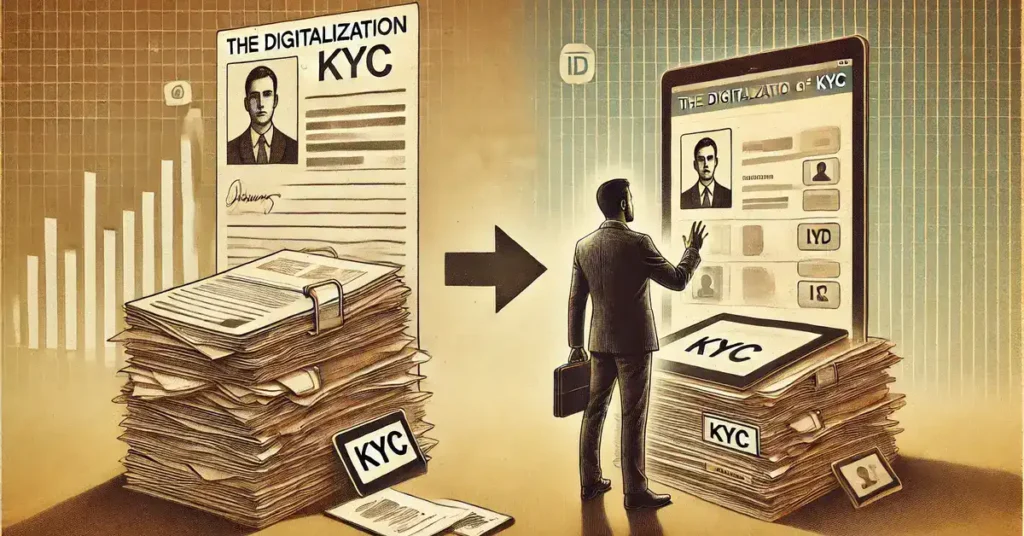Introduction
In a world where business relationships are increasingly remote, the digitalization of KYC (Know Your Customer) has become an essential lever for companies across all sectors. This digital shift is no longer limited to banks or fintechs. Today, whether you are an insurer, an online platform, or a real estate agency, the ability to quickly and reliably verify a customer’s identity has become crucial. The digitalization of KYC addresses three major imperatives: strengthening regulatory compliance, streamlining the customer experience, and actively combating document fraud and identity theft.
Understanding KYC and its challenges
The KYC process, which stands for “Know Your Customer,” is designed to verify a customer’s identity when creating an account or before performing sensitive operations. Initially, these regulatory obligations were primarily aimed at fighting money laundering and the financing of terrorism (AML-CFT). However, with the rise of online transactions and the increase in fraud attempts, KYC has become a cornerstone of digital security. It is now required in many industries, including banking, insurance, real estate, cryptocurrency, telecom, and e-commerce. Digitalizing this process not only helps automate checks, but also increases the reliability of identity verification while reducing processing time. See the Wikipedia article on this subject.
Why KYC digitalization has become essential
The digitalization of KYC is not merely a technical upgrade—it is a strategic response to very real challenges. From a regulatory perspective, it helps companies comply with European directives related to fraud prevention and personal data protection. The requirements of the GDPR, combined with those from anti-money laundering directives, demand strict traceability and secure storage of sensitive data. A digital KYC system provides these guarantees while significantly reducing human error.
From a user experience standpoint, the benefits are equally clear. In a digital economy where speed is key to customer retention, asking users to send documents by mail or visit a physical office is a major obstacle. Thanks to KYC digitalization, identity verification can now be completed in just a few minutes, directly from a smartphone, offering a smooth process that reduces abandonment rates and improves conversion.
When it comes to security, digital KYC tools dramatically improve fraud prevention. Technologies such as facial recognition with liveness detection, automatic analysis of identity documents, and cross-checks with official databases allow companies to detect fake documents and suspicious behavior more effectively. This is a proactive response to a growing threat affecting both individuals and organizations.
Tangible benefits for companies
Embracing the digitalization of KYC is, above all, an investment in productivity. By automating identity checks, companies can reduce the time spent on manual tasks and free up their teams to focus on higher-value work. It also leads to lower operating costs, by eliminating the need to handle, store, and manually verify physical documents. Beyond economic gains, digital KYC tools offer regulatory peace of mind: they are constantly updated to align with evolving compliance requirements, helping businesses stay ahead of their obligations.
One often overlooked advantage is brand image. By providing a fast, secure, and intuitive identification journey, companies modernize the customer relationship and build trust from the very first interaction. In a competitive market, that can be the deciding factor between a completed signup and an abandoned one.
Industries already leading the shift
The banking sector was the first to adopt digital KYC, especially neobanks and fintechs, which have built their models around fully online customer onboarding. Opening an account is now paperless, appointment-free, and includes instant identity verification powered by artificial intelligence. But this trend has since extended to many other sectors. Online marketplaces and rental platforms have started integrating KYC steps to secure transactions between users. Real estate agencies are using digital KYC to verify the reliability of prospective tenants.
In the insurance industry, KYC digitalization helps confirm the identity of policyholders and prevents fraud at the time of policy enrollment. Recruiters are also beginning to use digital tools to verify identity and educational qualifications during the hiring process. Even public institutions, often seen as slow to modernize, are gradually adopting digital KYC solutions to streamline administrative processes and fight identity fraud more effectively.
How to successfully implement digital KYC
To effectively deploy a digital KYC process, it is crucial to define clear goals. Is the main objective to ensure compliance, enhance user experience, or strengthen fraud detection? The answer to this question will determine the type of solution to implement—whether it’s an API integrated into your customer journey, a SaaS platform, or a custom-built system. Ensuring compatibility with existing infrastructure, such as CRM systems or back-office tools, is also essential.
The success of this transition depends greatly on team involvement. Even the most powerful tool is ineffective if it’s not well understood and properly used. Training employees, raising awareness about document fraud risks, and providing clear internal guidelines are key steps. Additionally, ongoing performance tracking—with KPIs such as fraud detection rates, average verification time, and abandonment rates—allows for continuous process improvement.
Conclusion
The digitalization of KYC has now become the standard in customer identity management. It’s no longer a luxury reserved for large corporations but a vital operational and strategic necessity for any company aiming to remain competitive, secure, and compliant. In a digital world where trust is the foundation of all relationships, having a reliable, digital identity verification system is fundamental to building lasting connections with users.
Anticipating risks, meeting legal obligations, protecting data, and offering a seamless experience—these are just a few of the reasons why the digitalization of KYC can no longer be ignored.
Individuals, do you occasionally need to verify one or more identity documents? Discover eligible documents in the store !
Small businesses, do you need to verify one or more identity documents via a web application? Discover the identity web suite!
Professionals, do you need to integrate proof of identity validation into one of your business processes, including all European identity cards and global passports? Discover our API with web application to validate the authenticity of an identity document in less than 10s!



